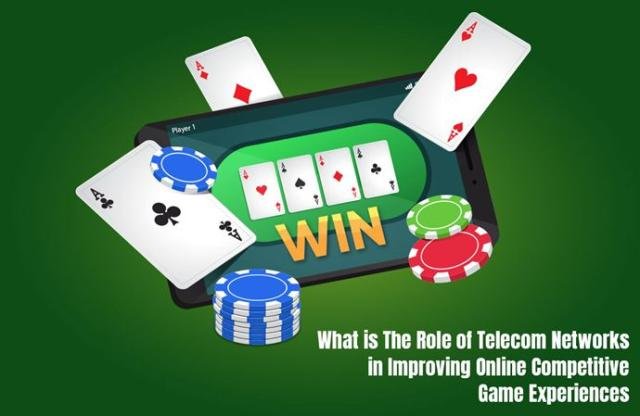Telecom networks play an integral role in shaping modern online gaming experiences. They are an integral component of the online gaming ecosystem and, with advances in network infrastructure and connectivity, are driving vast improvements in the quality of competitive gaming.

As players demand more reliable, faster, and lower-latency connections, telecom networks play an essential role in meeting these requirements. In this article, we delve into how telecom networks support competitive gaming and briefly touch upon future developments poised to make online gaming even more accessible and immersive.
What is the importance of telecom networks in online gaming?
Online gaming, especially in the multiplayer competitive gaming scene, requires low-latency, high-speed Internet connections. In fast-paced games like Dota 2 or Fortnite, and even multiplayer games like Call Break, a millisecond delay can be the difference between defeat and victory.
Telecom networks make sure that data packets, which carry in-game communications and actions, are promptly delivered without interruption. The primary areas where these networks influence the online gaming experience are:
- Ping times and latency – Latency is the time taken for a data packet to travel from the gamer’s device to the game server and back. It is measured in milliseconds. Through the development of 5G technology, the construction of data centers closer to users and improved fiber-optic cables, telecom networks have made massive strides in reducing the latency and improving ping times.
- Bandwidth – This refers to the amount of data that can be transferred at a given time. For online games, especially multiplayer ones with high-definition graphics, sufficient bandwidth is a requirement. Telecom networks have increased bandwidth by upgrading their existing infrastructure, improving fiber-optic networks, and enhancing broadband services.
- Packet loss and jitter – Jitter refers to the variation in time between data packets arriving at their destination. On the other hand, packet loss is the data that does not reach its intended location. Packet loss and jitter can both result in in-game stuttering, ruining the gaming experience. Telecom providers are creating more consistent and smoother gaming sessions by using sophisticated traffic management techniques that reduce packet loss and jitter.
What advances have been made by telecom networks to improve gaming experiences?
Telecom providers have made several noteworthy advances to improve the online gaming experience. Let’s examine them.
- 5G technology
One of the most significant advancements is the introduction of 5G technology. This technology promises low latency, ultra-fast speeds, and high capacity. For competitive players, 5G offers the ability to game on mobile devices with similar performance to that of wired connections. Moreover, 5G networks can handle more devices at once, making them ideal for eSports tournaments, large-scale gaming events, and cloud gaming platforms.
- Edge computing
Edge computing involves processing data closer to the user rather than in distant data centers. This has revolutionized telecom networks. Latency has been reduced by edge computing because it reduces the distance that data must travel.
Telecom providers are heavily investing in edge computing infrastructure, with companies like Verizon, AT&T and Deutsche Telekom at the forefront.
- Fiber-optic networks
For online gaming, fiber-optic technology has been a game-changer. Unlike traditional cables, fiber-optic cables are capable of transmitting data at nearly the speed of light. This has resulted in lower latency and much higher speeds.
- Cloud gaming
Cloud gaming has been around for a few years but the introduction of 5G technology gave it the push it needed to be adopted worldwide. In cloud gaming, the processing power needed to run games is handled by remote servers instead of the hardware of the users. Several telecom providers have partnered with cloud gaming platforms to deliver a lag-free experience. For instance, in 2021, Verizon partnered with Microsoft to improve the Xbox Cloud Gaming experience for its 5G users.
Thanks to these partnerships, the development of optimized networks that prioritize gaming traffic and decrease latency has been led.
Unveiling future developments
As telecom networks continue to evolve, several emerging technologies are expected to further augment the online gaming experience. Some of them are:
- 6G networks – While 5G is still being rolled out, researchers are already working on 6G technology. This technology promises even lower latency and faster speeds. 6G could enable entirely new gaming experiences, such as fully immersive VR games with no perceptible lag.
- Quantum computing and networking – Quantum computing and networking is still in its nascent stage but it holds a lot of potential in revolutionizing the telecom industry. Quantum networks could process and transmit data at unimaginable speeds, enabling entirely new forms of gaming, such as complex multiplayer environments and large-scale simulations.
- AI-powered network management – AI is being used by telecom companies to manage network traffic much more efficiently. By assessing real-time data, AI is capable of identifying potential network issues before they occur and rerouting traffic to ensure smooth gameplay. In the future, AI is poised to be used to create networks that are specifically optimized for gaming, which might further improve performance by reducing latency.
Summing up
Telecom networks are at the heart of the online competitive gaming experience, providing the infrastructure needed to ensure smooth, fast, and reliable gameplay. Through advancements in 5G technology, fiber-optic networks, edge computing, and cloud gaming, telecom providers have significantly reduced latency and improved bandwidth, allowing gamers to compete at the highest levels without technical barriers. As technologies like 6G, AI, and quantum computing continue to develop, the future of online gaming promises to be even more exciting, immersive, and competitive.
